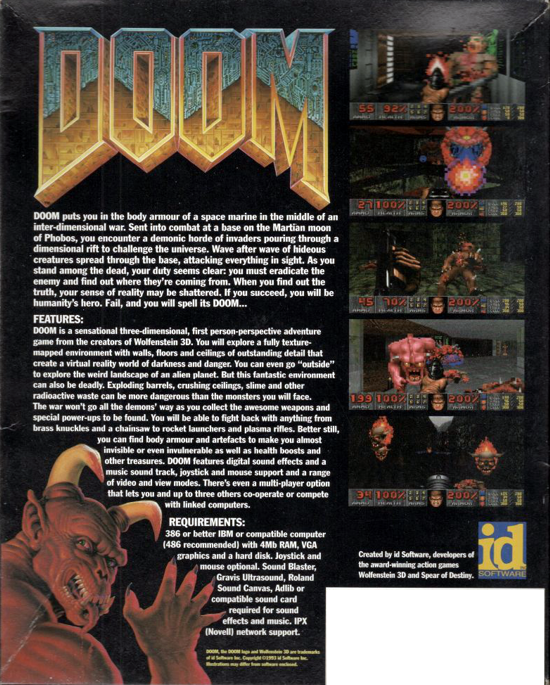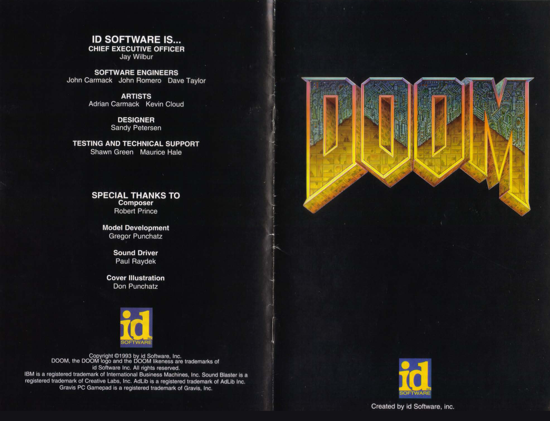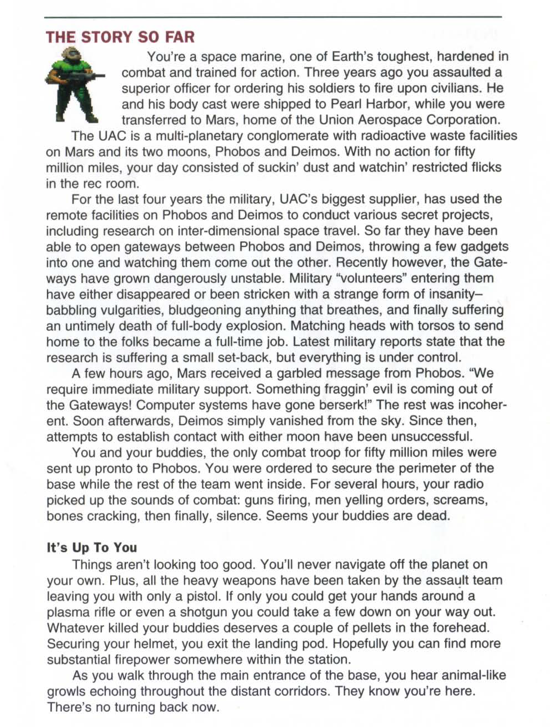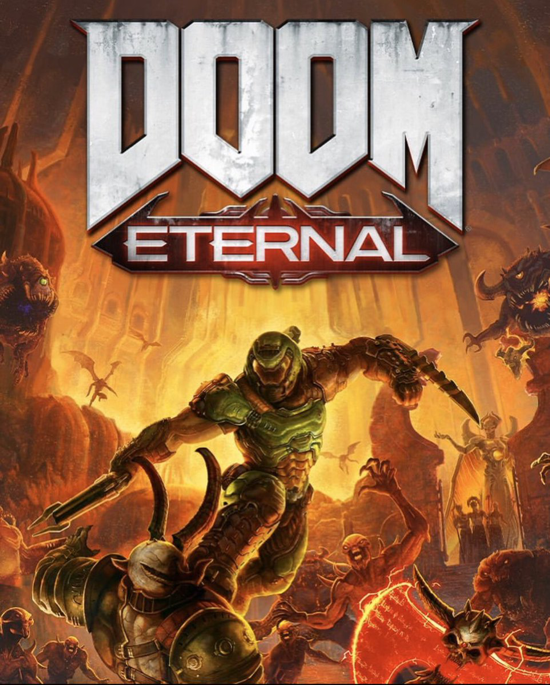 |
| DOOM logo 1993 |
Name: "DOOM"
Category: Video games
Subcategory: FPS First-Person Shooter
Genre: Science-Fiction / Horror
Developer: id Software - Mesquite, Texas, USA
Prerelease versions (1993):
--- 0.2 Alpha (February 4)
--- 0.3 Alpha (February 28)
--- 0.4 Alpha (April 2)
--- 0.5 Alpha (May 22)
--- Press release (October 4)
--- 0.2 Alpha (February 4)
--- 0.3 Alpha (February 28)
--- 0.4 Alpha (April 2)
--- 0.5 Alpha (May 22)
--- Press release (October 4)
Released: December 10, 1993 - Doom 0.99 (aka 1.0) shareware, debut at the University of Wisconsin-Madison, USA
Publisher: GT Interactive - New York City, USA
Designers: Sandy Petersen, John Romero, Shawn Green, Tom Hall
Programmers: John Carmack, John Romero, Dave Taylor
Graphics: Adrian Carmack, Kevin Cloud, Gregor Punchatz
Writer: Tom Hall (author of the "Doom Bible")
Number of players: Single-player, network multiplayer (max. 4)
Background and characters: See images below
Music by: Robert Prince
Features: Doom is a science-fiction/horror first-person shooter where the player, as a nameless space marine, liberate space stations from demon infestation. In Doom, players progress through each level, blasting away enemies while solving puzzles (involving switches, keycards, and skull-shaped key devices), avoiding environmental hazards (such as crushing ceilings, radioactive acid, and burning lava), and collecting weapons, ammo, and other items (including first-aid kits, body armor, suits that protect from radiation, night-vision goggles, computer maps, and supernatural orbs that grant a special bonus to the player). Weapons are: fist, chainsaw, pistol, shotgun, chaingun, rocket launcher, plasma rifle, and BFG 9000, which fires a huge plasma ball. The game's campaign is split up into three episodes (each with eight normal levels and one secret level). The objective of each level is simply to locate the exit room that leads to the next area, marked with an exit sign and/or a special kind of door, while surviving all hazards on the way. "Knee-Deep in the Dead" is the only episode playable in the shareware version. It deals with the marine's journey through the base established on Phobos. In the second episode, "The Shores of Hell", after defeating the two big bruisers guarding the teleportation gateway, the marine passes through into Deimos. As the invasion continues, the base becomes more distorted with hellish architecture. The second episode deals with the marine's liberation of demons from the Deimos base. In the third (and final) episode "Inferno", the marine fights a giant anomaly of flesh and metal known as the Cyberdemon.
The game's engine is known to pioneer new features to the genre, including non-perpendicular walls, complex rooms (known as "sectors") with varying height differences, multiplayer (both co-operatively and competitively, for up to four players at a time) and the concept of packaging the game's content (levels, sounds, and music) into singular files (WAD files) for easier modification and distribution. The original game was distributed via shareware and mail order.
The game's engine is known to pioneer new features to the genre, including non-perpendicular walls, complex rooms (known as "sectors") with varying height differences, multiplayer (both co-operatively and competitively, for up to four players at a time) and the concept of packaging the game's content (levels, sounds, and music) into singular files (WAD files) for easier modification and distribution. The original game was distributed via shareware and mail order.
Interesting facts: The development of Doom started in 1992, when John D. Carmack developed a new 3D game engine, the Doom engine, which featured relatively realistic 3D graphics, texture mapping of all surfaces, variable light levels, and floors at varying altitude. Designer Tom Hall wrote an elaborate design document called the Doom Bible, according to which the game would feature a detailed storyline, multiple player characters, and a number of interactive features. However, most of the level design that ended up in the final game is that of John Romero and Sandy Petersen. Doom was widely praised in the gaming press and is broadly considered to be one of the most important and influential titles in gaming history. Although most users did not purchase the registered version, over one million copies have been sold, and the popularity helped the sales of later games in the Doom series that were not released as shareware.
Slogan (1994): «Want to be a Hero? Go to Hell!»
Property: id Software - ZeniMax Media
Product website: http://doom.com
 |
 |
| DOOM, box cover art by Don Ivan Punchatz |
 |
| DOOM, box and content |
 |
| DOOM, cover for the manual |
 |
 |
| DOOM, background and characters (images from the manual) |
DOOM, Episode 1: "Knee-Deep in the Dead" - Level 1, medium skill gameplay |
 |
| DOOM magazine preview (Electronic Games, December 1993) |
 |
| DOOM advertising (1994) |
 |
| John D. Carmack (August 20, 1970), the American game programmer, aerospace and virtual reality engineer who co-founded id Software and developed the Doom 3D game engine |
 |
| DOOM in its advanced version: DOOM Eternal (March 20, 2020) |



